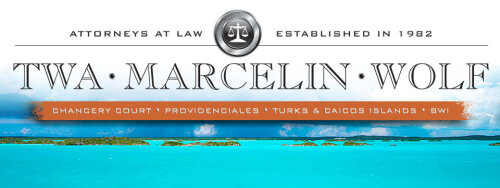Best Real Estate Contracts and Negotiations Lawyers in Providenciales
Share your needs with us, get contacted by law firms.
Free. Takes 2 min.
Free Guide to Hiring a Real Estate Lawyer
List of the best lawyers in Providenciales, Turks and Caicos Islands
About Real Estate Contracts and Negotiations Law in Providenciales, Turks and Caicos Islands
Real estate transactions in Providenciales, Turks and Caicos Islands involve a host of legal processes and documentation to ensure that property dealings are valid, transparent, and enforceable. Real estate contracts and negotiations cover various aspects of buying, selling, leasing, and transferring properties. These transactions are often high-value, making it essential that parties understand their rights, obligations, and potential risks. Whether dealing with residential, commercial, or investment property, properly drafted contracts and effective negotiations protect the interests of all parties involved.
Why You May Need a Lawyer
Legal guidance is crucial during real estate transactions in Providenciales for several reasons. Lawyers can help in the following situations:
- Reviewing and drafting contracts of sale, lease agreements, and other documentation to ensure legal compliance and clarity.
- Due diligence checks, such as verifying title, ownership, existing mortgages, encumbrances, or restrictions on the property.
- Negotiating terms and conditions to reflect your interests and minimize potential disputes in the future.
- Assisting non-resident buyers with understanding restrictions or procedures unique to foreigners purchasing property in Turks and Caicos Islands.
- Resolving disputes or misunderstandings that arise before, during, or after the transaction.
- Ensuring all government fees, stamp duties, and taxes are appropriately assessed and paid.
- Handling complex transactions, such as commercial leases, development projects, or joint ventures.
Having a competent lawyer can save time, money, and stress by helping you avoid pitfalls and ensuring a smooth transaction.
Local Laws Overview
Real estate law in Turks and Caicos Islands has several distinctive features, especially on Providenciales as the commercial and tourism hub. Key aspects include:
- Freehold vs. Leasehold: Most land in Turks and Caicos Islands is held freehold, but some government land may be leasehold. Understanding the difference is vital for buyers.
- Land Registry: Property ownership is recorded at the Land Registry, and every real estate transaction must be registered. Verification of title is an essential step before purchase.
- Stamp Duty: Transactions are subject to stamp duty, which varies based on the value of the property and the status of the buyer (Belonger vs. non-Belonger).
- Foreign Ownership: There are minimal restrictions on foreign ownership, but all buyers must follow local processes and tax requirements.
- Legal Requirements: All contracts for the sale or transfer of real estate must be in writing and properly executed to be legally enforceable.
- Disclosure Obligations: Sellers are generally obligated to disclose material facts or known defects about the property.
- Deposit and Escrow: It is standard for buyers to pay a deposit (usually 10 percent) held in escrow by a lawyer until completion.
Frequently Asked Questions
Do I need a lawyer to buy or sell property in Providenciales?
While not legally mandatory, it is strongly recommended to use a qualified local lawyer to protect your interests and ensure compliance with Turks and Caicos Islands laws during real estate transactions.
Are there any restrictions on foreign buyers?
Generally, there are no major restrictions on foreigners buying property, but buyers must comply with all local registration and stamp duty requirements.
What is stamp duty and who pays it?
Stamp duty is a government tax on property transactions. The buyer typically pays stamp duty upon completion of the transaction.
How much is the standard deposit?
The standard deposit is usually 10 percent of the purchase price and is held in escrow by the buyer's or seller's lawyer until completion.
What should I check before signing a real estate contract?
Before signing, ensure you have verified the seller's title, confirmed there are no outstanding charges or liens, understood all terms and conditions, and verified compliance with zoning and planning regulations.
Can I negotiate the purchase price and other terms?
Yes, most terms, including price, completion date, and included fixtures, are negotiable. A lawyer or real estate agent can assist in these negotiations.
Are verbal agreements binding in real estate sales?
No, under Turks and Caicos Islands law, real estate sales must be documented in writing to be legally enforceable.
What happens if either party breaches the contract?
If a party breaches the contract, the non-breaching party may be entitled to damages or specific performance (forcing completion of the sale), depending on the circumstances and contract terms.
What is involved in the closing process?
The closing process involves final due diligence checks, settling the balance of the purchase price, payment of stamp duty, and registration of the transfer at the Land Registry.
How long does a typical real estate transaction take?
Most transactions in Providenciales can close within 4 to 8 weeks, but more complicated deals or delays in obtaining documentation can extend this period.
Additional Resources
You can obtain information and assistance from several reliable sources:
- Turks and Caicos Islands Land Registry - For title searches and registration information
- Attorney General's Chambers - For legal guidance on local property laws
- Real Estate Association of Turks and Caicos (TCI Real Estate Association) - For professional real estate agents
- Turks and Caicos Islands Government - For rules on stamp duty and foreign ownership
- Local law firms specializing in property law and conveyancing
Next Steps
If you are considering entering into a real estate transaction in Providenciales, begin by consulting a reputable local lawyer experienced in real estate law. They will be able to review your situation, advise on your options, and guide you through the process from negotiation to closing. Compile all relevant documents, such as identification, proof of funds, or existing property documentation, to expedite your legal consultation. Additionally, research local real estate professionals who understand the unique aspects of property transactions in Turks and Caicos Islands. Proper legal advice is the best way to safeguard your interests and ensure your transaction proceeds smoothly and successfully.
Lawzana helps you find the best lawyers and law firms in Providenciales through a curated and pre-screened list of qualified legal professionals. Our platform offers rankings and detailed profiles of attorneys and law firms, allowing you to compare based on practice areas, including Real Estate Contracts and Negotiations, experience, and client feedback.
Each profile includes a description of the firm's areas of practice, client reviews, team members and partners, year of establishment, spoken languages, office locations, contact information, social media presence, and any published articles or resources. Most firms on our platform speak English and are experienced in both local and international legal matters.
Get a quote from top-rated law firms in Providenciales, Turks and Caicos Islands — quickly, securely, and without unnecessary hassle.
Disclaimer:
The information provided on this page is for general informational purposes only and does not constitute legal advice. While we strive to ensure the accuracy and relevance of the content, legal information may change over time, and interpretations of the law can vary. You should always consult with a qualified legal professional for advice specific to your situation.
We disclaim all liability for actions taken or not taken based on the content of this page. If you believe any information is incorrect or outdated, please contact us, and we will review and update it where appropriate.










